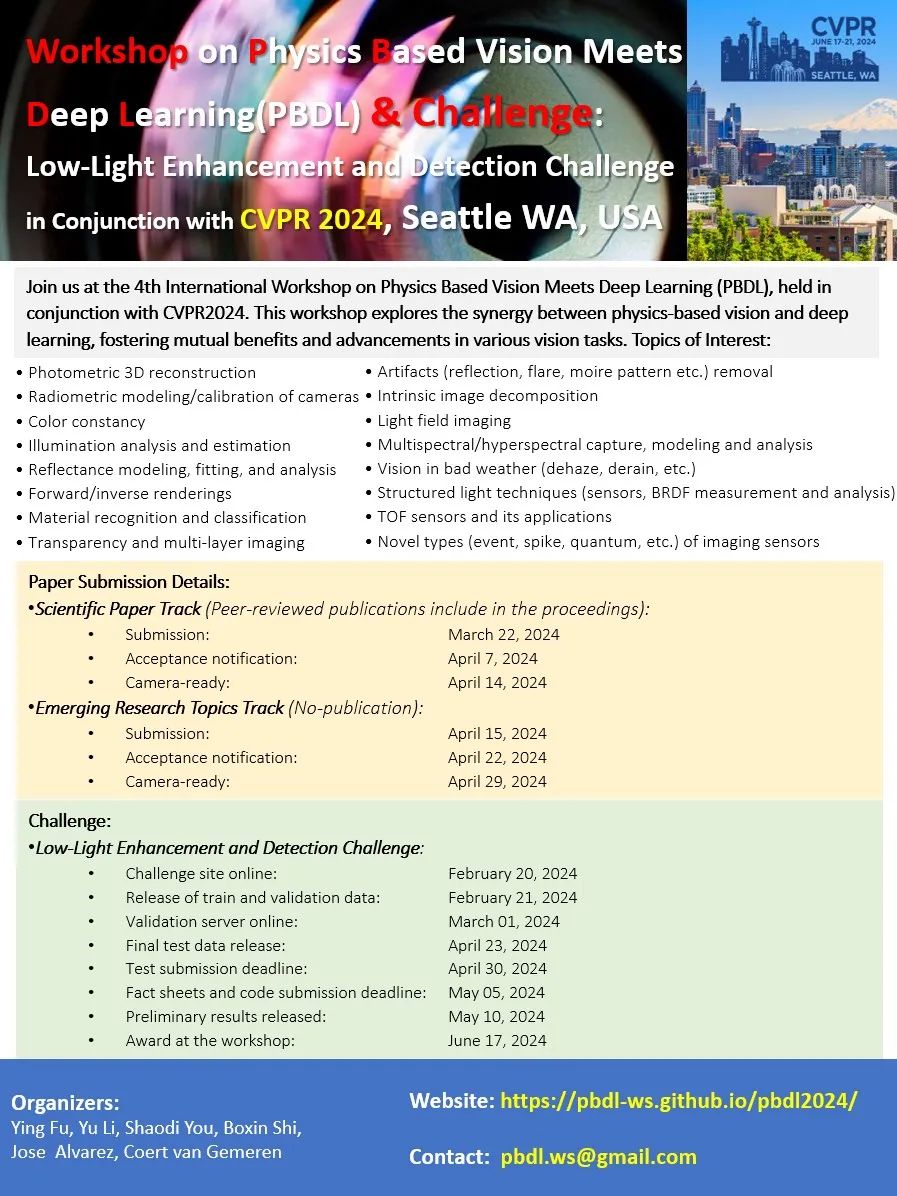关注公众号,发现CV技术之美
Call for Challenge: Low-Light Enhancement and Detection Challenge
Following the success of previous workshops, we propose the 4rd workshop using the same title and topics with CVPR2024, 17th June 2024, Seattle US. The goal is to encourage the interplay between physics based vision and deep learning. Physics based vision aims to invert the processes to recover the scene properties, such as shape, reflectance, light distribution, medium properties, etc., from images. In recent years, deep learning shows promising improvement for various vision tasks. When physics based vision meets deep learning, there must be mutual benefits.
We welcome submissions of new methods in the classic physics based vision problems, but preference will be given to novel insights inspired by utilizing deep learning techniques. Relevant topics include but are not limited to
Deep learning +
Photometric 3D reconstruction
Radiometric modeling/calibration of cameras
Color constancy
Illumination analysis and estimation
Reflectance modeling, fitting, and analysis
Forward/inverse renderings
Material recognition and classification
Transparency and multi-layer imaging
Artifacts (reflection, flare, moire pattern etc.) removal
Intrinsic image decomposition
Light field imaging
Multispectral/hyperspectral capture, modeling and analysis
Vision in bad weather (dehaze, derain, etc.)
Structured light techniques (sensors, BRDF measurement and analysis)
TOF sensors and its applications
Novel types (event, spike, quantum, etc.) of imaging sensors
Website:
https://pbdl-ws.github.io/
Paper submission:
https://openreview.net/group?id=thecvf.com/CVPR/2024/Workshop/PBDL
Important dates:
Scientific Paper Track (Peer-reviewed publications include in the proceedings):
Paper Submission: March 22, 2024
Acceptance notification: April 7, 2024
Camera-ready: April 14, 2024
Emerging Research Topics Track (No-publication):
Paper Submission: April 15, 2024
Acceptance notification: April 22, 2024
Camera-ready: April 29, 2024
Workshop date: June 17, 2024
The format for paper submission is the same as the CVPR 2024 submission format. For Scientific Paper Track papers that violates the anonymity, do not use the CVPR submission template or have more than 8 pages (excluding references) will be rejected without review. The accepted papers will appear in the proceedings of CVPR 2024 workshops. In submitting a manuscript to this workshop, the authors acknowledge that no paper substantially similar in content has been submitted to another workshop or conference during the review period. For Emerging Research Topics Track submissions are non-anonymous and will not be included in the proceedings. Submissions can be resubmission of published papers. Selections are made by workshop organizers.
Challenge:
Low-Light Enhancement and Detection Challenge:https://pbdl-ws.github.io/pbdl2024/challenge/index.html
Important dates:
Challenge site online: February 20, 2024
Release of train data and validation data: February 21, 2024
Validation server online: March 01, 2024
Final test data release (inputs only): April 23, 2024
Test submission deadline: April 30, 2024
Fact sheets and code submission deadline: May 05, 2024
Preliminary results released to participants: May 10, 2024
Award (at the workshop): 17 June, 2024
























 1108
1108

 被折叠的 条评论
为什么被折叠?
被折叠的 条评论
为什么被折叠?








